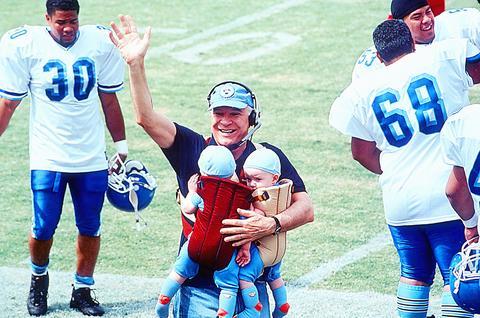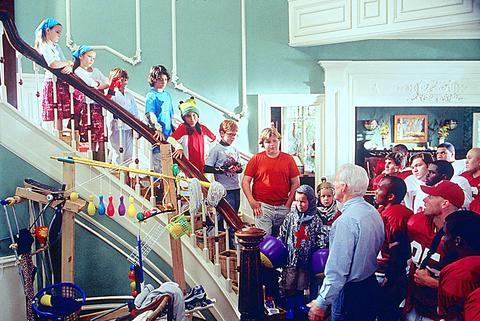Cheaper by the Dozen is a bubbling crockpot of farcical mush to warm the tummies of anyone who really and truly misses The Brady Bunch, and I mean really and truly.
This story of a big, mostly happy family that includes 12 mostly adorable children and two mostly adoring parents, whose 23-year marriage still has a snap of sex, is set in suburban Illinois. But its real location is that imaginary playground of cheery roughhouse and sanitized mischief known as sitcomland. It is a place where the darkest scowl has a silver lining of twinkling affection, and where the toys may be modern but the year will now and forever be 1955.

PHOTOS COURTESY OF FOX
The movie, which opens in Taiwan today, is nominally a remake of the 1950 family comedy starring Clifton Webb and Myrna Loy. (Both films are adapted from a best-selling 1948 memoir by Frank Bunker Gilbreth Jr. and his sister Ernestine Gilbreth Carey.) In this new version, which has little resemblance to the book, the parents' names have been changed along with their backgrounds. Tom Baker (Steve Martin), the genial ruler of the roost, is a college football coach who sacrificed his dreams of working with a first-division team to settle for a third-division outfit in cozy, sleepy Midland, Illinois. His wife, Kate (Bonnie Hunt), gave up a career as a newspaper journalist to play supermom. Somehow she has found time to complete a family chronicle that she has been

peddling to publishers.
With Parenthood and two Father of the Bride movies under his belt, Martin has earned his crown as the movies' most affably, reassuring 1950s-style dad since Spencer Tracy, and he is the best thing in the movie. Martin barely has to think to play Tom, a role that is not just a piece of cake but a morsel of buttery fudge that instantly melts in his mouth.
Never mind that the notion of Martin as a college football coach is laughable. With his signature grimace, a wince that passes for a smile at moments of peak stress, he is the apotheosis of long-suff-ering paternal unflappability. Hunt's Kate, who supervises the brood's assembly-line breakfasts, is also perfect. But to accept her as the mother of 12 is to believe that rigorous child-bearing is the surest path to achieving the svelte figure, unlined face and perky temper-ament of an efficient, even-tempered high school girl enraptured by classes in home economics.
The movie follows the Bakers through a crisis brought on by Mom and Dad's late-blooming decision to try to have it all. Just when Mom's memoir is accepted by a New York publisher who insists that she go on a book tour, Dad's deferred football dreams are reignited with an invitation to coach a first-division team in another town. Despite a lot of grumbling by the children, the family moves from Midland to a sprawling dream house in Evanston, which the film portrays as a hypercompetive yuppie enclave out of sync with the Bakers' homier approach to life.
But with Mom away and Dad sweating to prove himself in his high-powered job, who will run the household? The oldest daughter, Nora, who has moved out of the house to be with her vain boyfriend (an uncredited Ashton Kutcher) sporadically pitches in. But there is finally no substitute for Mom (is there ever?), who is off hawking her book on Live With Regis and Kelly, with Oprah waiting in line, and chaos erupts.
The movie farce revolves around elaborate comic set pieces in which a minor mishap like an escaped pet frog at the breakfast table sets off a dizzying chain reaction that leaves everything in a shambles. When the children disagree with family policy, they organize themselves into cute little protesting armies. The most distinctive of the younger children is Mark (Forrest Landis), a nerdy misfit called FedEx by his siblings to suggest he was sent to the family by accident. Not to worry, however: no one in this brood is capable of real cruelty. Two older children, football-playing Charlie (Tom Welling) and fashion-conscious Lorraine (Hilary Duff), are as bland and personality-deficient as Hunt's Kate. Neither role could be called career advancing.
If Cheaper by the Dozen, directed by Shawn Levy, has only the most tenuous hold on reality, its happy times carry a sting of regret. To surrender to a movie like this is to buy on some level its impossibly idealized portrait of family togetherness.
Once its cozy glow wears off, a tiny part of you is likely to feel a pang that your family isn't as happy and secure as the Bakers. No family could be.

Cheng Ching-hsiang (鄭青祥) turned a small triangle of concrete jammed between two old shops into a cool little bar called 9dimension. In front of the shop, a steampunk-like structure was welded by himself to serve as a booth where he prepares cocktails. “Yancheng used to be just old people,” he says, “but now young people are coming and creating the New Yancheng.” Around the corner, Yu Hsiu-jao (饒毓琇), opened Tiny Cafe. True to its name, it is the size of a cupboard and serves cold-brewed coffee. “Small shops are so special and have personality,” she says, “people come to Yancheng to find such treasures.” She

Late last month Philippines Foreign Affairs Secretary Theresa Lazaro told the Philippine Senate that the nation has sufficient funds to evacuate the nearly 170,000 Filipino residents in Taiwan, 84 percent of whom are migrant workers, in the event of war. Agencies have been exploring evacuation scenarios since early this year, she said. She also observed that since the Philippines has only limited ships, the government is consulting security agencies for alternatives. Filipinos are a distant third in overall migrant worker population. Indonesia has over 248,000 workers, followed by roughly 240,000 Vietnamese. It should be noted that there are another 170,000

Hannah Liao (廖宸萱) recalls the harassment she experienced on dating apps, an experience that left her frightened and disgusted. “I’ve tried some voice-based dating apps,” the 30-year-old says. “Right away, some guys would say things like, ‘Wanna talk dirty?’ or ‘Wanna suck my d**k?’” she says. Liao’s story is not unique. Ministry of Health and Welfare statistics show a more than 50 percent rise in sexual assault cases related to online encounters over the past five years. In 2023 alone, women comprised 7,698 of the 9,413 reported victims. Faced with a dating landscape that can feel more predatory than promising, many in

“This is one of those rare bits of TikTok fitness advice with a lot of truth behind it,” says Bethan Crouse, performance nutritionist at Loughborough University. “Sometimes it’s taken a bit too literally, though! You see people chugging protein drinks as they’re scanning out of their gym.” Crouse recommends the athletes she works with consume 20-30g of protein within 30-60 minutes of finishing a resistance training session. “The act of exercising our muscles increases the breakdown of muscle proteins,” she says. “In order to restore, or hopefully improve them — and get gains such as increased muscle mass or strength —